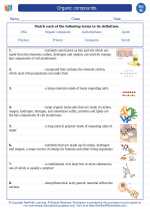Minerals
Minerals are naturally occurring inorganic substances that have a crystalline structure and a unique chemical composition. They are the building blocks of rocks, and they play a crucial role in the Earth's geology. Understanding minerals is important in various scientific fields, including geology, chemistry, and environmental science.
Characteristics of Minerals
There are five key characteristics that define minerals:
- Naturally Occurring: Minerals are formed through natural geological processes, such as crystallization from magma or precipitation from water.
- Inorganic: Minerals are not formed by living organisms and are not composed of organic compounds.
- Crystalline Structure: Minerals have a specific internal arrangement of atoms, which results in a regular geometric shape.
- Definite Chemical Composition: Each mineral has a specific chemical formula that defines its composition.
- Physical Properties: Minerals have characteristic physical properties, such as hardness, cleavage, and color.
Classification of Minerals
Minerals can be classified into several groups based on their chemical composition and crystal structure. The main mineral groups include:
- Silicates: The largest and most important group of minerals, composed of silicon and oxygen atoms, often combined with other elements such as aluminum, iron, and magnesium.
- Carbonates: Minerals containing the carbonate ion (CO3) as a fundamental component, including calcite and dolomite.
- Oxides: Minerals composed of oxygen and a metal, such as hematite and magnetite.
- Sulfides: Minerals containing sulfur combined with a metal, like pyrite and galena.
- Sulfates: Minerals that contain the sulfate ion (SO4), including gypsum and barite.
- Native Elements: Minerals that are composed of a single element, such as gold, silver, and diamond.
Importance of Minerals
Minerals have significant importance in various aspects of human life and the environment:
- They are essential for the formation of rocks and the Earth's crust.
- They are used in industrial processes, construction, and manufacturing of various products.
- Many minerals are valuable resources, such as metals, gemstones, and energy minerals like coal and oil.
- Understanding minerals is crucial for environmental conservation and sustainable use of natural resources.
Studying Minerals
When studying minerals, it's important to focus on their physical and chemical properties, as well as their geological occurrence and economic significance. Here are some key points to consider:
- Learn to identify common minerals based on their physical properties, such as color, hardness, luster, and cleavage.
- Understand the crystal structures and chemical compositions of different mineral groups.
- Explore the geological processes involved in the formation and occurrence of minerals, including igneous, sedimentary, and metamorphic processes.
- Examine the uses and economic importance of specific minerals in industries and everyday life.
By mastering the characteristics and significance of minerals, you can gain a deeper understanding of the Earth's composition and the role of minerals in shaping our planet.
[Minerals] Related Worksheets and Study Guides:
.◂Science Worksheets and Study Guides Eighth Grade. Organic compounds
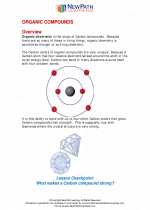
 Worksheet/Answer key
Worksheet/Answer key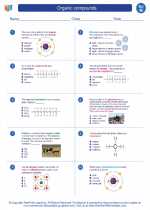
 Worksheet/Answer key
Worksheet/Answer key
 Worksheet/Answer key
Worksheet/Answer key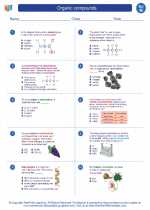
 Vocabulary/Answer key
Vocabulary/Answer key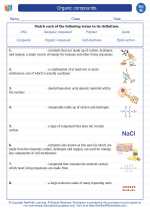
 Vocabulary/Answer key
Vocabulary/Answer key